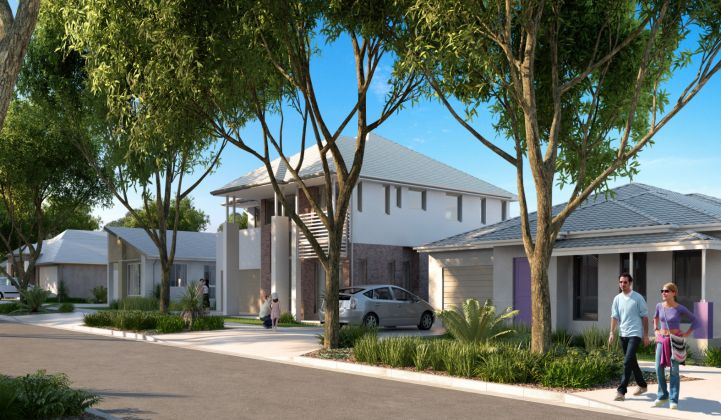Alkimos Beach has become Australia’s most sustainable suburb thanks to a solar and battery storage project supported by the Australian Renewable Energy Agency (ARENA).
The neighborhood, in Perth, Western Australia, has become the first to obtain six stars on the Green Building Council of Australia’s sustainability scale.
It is estimated residents will save around 15 percent on their electricity bills by supplementing grid supplies with rooftop solar and energy storage from a 1.1-megawatt-hour containerized lithium-ion battery system.
More than 100 homes in the community have been fitted with solar panels, all feeding into batteries housed in two shipping containers. The battery system, installed by Perth-based engineering firm Energy Made Clean, was connected to the grid in mid-December 2015.
No details of the battery manufacturer have been released.
Western Australia’s largest energy provider, Synergy, is one of the main partners in the pilot project, even though it stands to lose out because of the bill savings.
The electricity firm approached ARENA in partnership with property developer Lendlease to seek AUD $3.3 million (USD $2.5 million) to help pay for the AUD $6.7 million (USD $5.1 million) trial.
Synergy expects to use Alkimos as a test bed for new retail products and services. Residents will get an Energy Smart Home package supporting solar water heaters, PV systems and energy efficiency measures.
More widely, the Alkimos experiment could be seen as giving Synergy an opportunity to use community engagement as a way of combating the threat of grid defection.
“Lessons learned from this project will help to address technical, financial and regulatory roadblocks that community-scale storage projects face on the road to commercialization,” said ARENA CEO Ivor Frischknecht. “[It will] also help us to better understand how they can operate within traditional networks.”
Frischknecht said ARENA has “a number of other trials underway that are looking at different aspects of energy storage, but there is not yet [sufficient] data to say which model is better or in which circumstances which model works best.”
Elsewhere in Western Australia, ARENA has put AUD $1 million (USD $763,000) in grant money toward a community solar-plus-storage project in White Gum Valley.
The three-year project includes about 40 residential PV installations and involves grid operator Western Power, government land developer LandCorp, BYD distributor Solar Balance, Curtin University, the City of Fremantle and the Cooperative Research Centre for Low Carbon Living.
ARENA is also involved in community solar-plus-storage pilots in Queensland with Ergon Retail, the Australian Capital Territory with Reposit Power, and New South Wales with Brookfield Energy Australia.
The agency hopes the combined learning from these projects will help inform Australian policy and market development.
“People who install batteries are doing it for the first time,” Frischknecht commented. “What permits do you need to do this? What safety standards apply? What sort of tariff will the energy companies offer? All those kinds of questions have yet to be answered.”
It is clear from the number of utilities involved that the electricity companies want to be part of the answer, too.
“It is unlikely that a significant number of Australian households will pursue full grid defection," said Brett Simon, a storage analyst with GTM Research, who recently authored a report on Australia's storage market.
“However, given high electricity prices, high behind-the-meter solar penetration and declining and expiring feed-in tariff schemes, Australian households will increasingly pursue battery storage for purposes of solar self-consumption, especially as storage system prices decline," said Simon.
Australian electricity retailers are already seriously investigating energy storage, he confirmed.
“A number of electricity retailers, such as AGL Energy, already offer energy storage to their retail customers,” he said. “Trials are underway to investigate battery storage as well: for example, Ergon Energy is pursuing a virtual power plant pilot project with Sunverge.”
The endgame for energy companies is to minimize revenue losses from distributed generation.
“Government-funded projects may offer some benefits to electricity retailers, as the results of trial projects will offer increased understanding of the role energy storage can play behind the meter, and may aid in developing new business models," Simon said.



